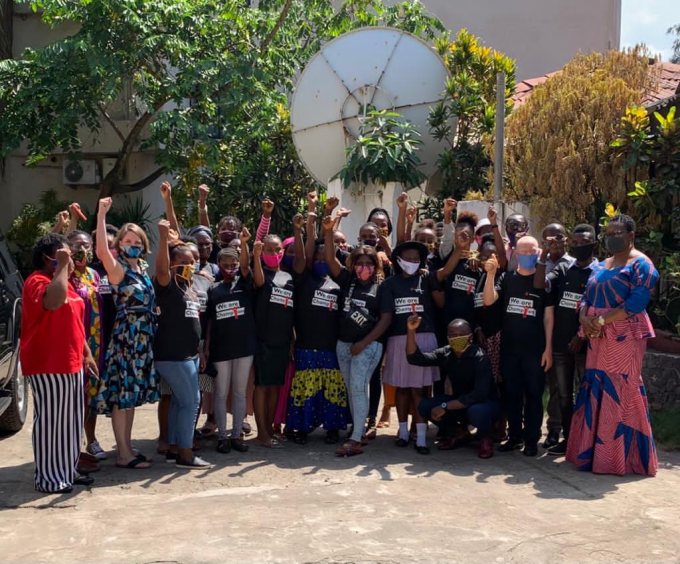Girl Champions hold frank conversations with policy and decision makers

Girls champions with stakeholders at the Family Kingdom on Thursday 26 November in Freetown. Photo credit Maxwell for Save the Children
On Thursday 26th November 2020, girl champions from across all Save the Children operational communities in Freetown held frank discussion about protection and health issues affecting girls in Sierra Leone and how this impacts their education outcomes.
The champions met with Country Director of Save the Children, Heather Campbell, the National Coordinator for the Secretariat for the Reduction of Teenage Pregnancy, Madam Patricia Bah and Mr. Bashiru Thullah, a representative of the Minister of Gender and Children Affairs.
In her statement, Heather Campbell applauded the champions for calling a meeting two days into 16 days of activism to speak frankly about the various protection challenges they and girls they represent face every day. She expressed the need for children to continue to amplify their voices to make Sierra Leone a safe place for girls.
“Too often there are policies, laws and plans made for children and youth without actually listening to their voices. At the end of the day it is you who would have to live with the future. Whether it is the environment, whether it is a health policy, whether it is education, it affects you, it affects your peers. You have to have a voice. You need to make your voice heard. You need to make decision makers really take note that this is important and you need to step up as important members of Sierra Leonean society too.” she said.
“This is not just about acting. It is not just saying ‘what can you do for me?’ but also what can I do for other people. That is what is so exciting today because I see the future of Sierra Leone being very bright. I see people who are going to make a huge difference.”
Madam Patricia Bah, National Coordinator of the Secretariat for the Reduction of Teenage Pregnancy spoke on government strides in protecting and empowering girls and women.
“Girls empowerment is crucial for the overall development of the country. Girls are empowered when they are able to access the opportunities available to them without limitation in education, employment and life style”.
While Bashiru Thullah, representing the Minister of Gender and Children’s Affairs talked of the gains made by the ministry but admitted that despite these gains there was need for government to do more.
Girls share their views on protection
Salmata Davies, one of the youth champions, spoke on the need for stronger protection systems for girls at community level. She gave an example of “Wata for Wata” where girls have to exchange sex to have access to water with no consequences for perpetrators. She talked of poor parenting and how this is contributing to risks for girls and asked the decision makers to work with communities to increase awareness as well as responsibility to protect girls.
Closing her statement, Salmata remarked “We are girls. We are not weak. Let no man take our meekness to be weakness. Let us be the first to protect ourselves in any situation because together we are powerful!”
This meeting ended a series of engagements with stakeholders in Western Area and Pujehun districts.
The girls’ champions campaign ran from October to November. It aimed to amplify the voice of girls to speak to issues around protection and education for girls’ empowerment. While champions in Freetown engaged decision makers on teenage pregnancy and sexual reproductive health rights, girls in Pujehun moved from community to community speaking to leaders and peers on the negative impact of child marriage, calling on traditional leaders to protect girls from this harmful cultural practice for healthier, happier and prosperous communities.
 Sierra Leone
Sierra Leone